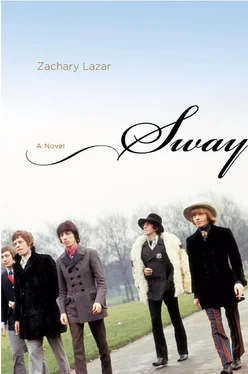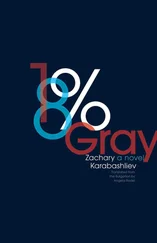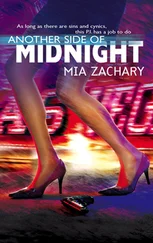The crowd went back and back, farther than you could see. Even if you wanted to leave now, it would not be easy. There were so many people lolling around, playing flutes or blowing bubbles, their faces so open it was hard to look at them for very long.
ANDY: They were going to make a record — that was something you were always hearing about back then. But that’s what nobody understands. Charlie wasn’t interested in making a record. I don’t think Bobby ever really understood how far from all that Charlie was, all that rock-and-roll crap.
DAVE: It was a ramshackle hundred acres set up in the hills above L.A. Lots of dogs. A couple dozen horses. At night you would hear the coyotes. You could walk for miles out there and never see another human being.
LISA: The trees, the dry riverbeds, the mountains. The mountains would get this fabulous yellow color, with these gray bushes up the sides. Sudden, powerful rainstorms. Rain that would just pour and pour all night. You’d forget what century you were living in.
DIANE: We raised artichokes. We would sell them in town, and then for a while we had the tourists come in and we’d run it as a dude ranch. We’d put on these long-sleeved flannel shirts, and we’d take these people out on trail rides. Cook them pancake breakfasts. At night, we’d make a fire and sing songs.
DAVE: One day Bobby drove up with one of his girlfriends and this dog he had, a big white dog. This was probably toward the beginning of 1969. By then, there were more and more people starting to hang around, living in the various outbuildings and the old bunkhouses.
LISA: He had that kind of crooked face, like he was up to something. That long black hair, the clothes. I think everybody was kind of in love with him. Even Charlie was sort of in love with Bobby.
KATHY: Riding the horses through the desert. Getting up early so you could be out there when the sky was still purple and then you’d watch it all turn orange. We all got to be good riders. Learned how to saddle them, put the bridles on.
DIANE: I don’t know how to explain it. I just knew that everything in my life up to then had been this painful, unnecessary lie.
KATHY: The mountains were just shimmering with light. Birds shimmering out of the rocks. You’d find these dried-up old trees — weird, religious trees. We just took off our clothes and made love in the dirt, just balled all day, like no one had ever done it before.
DIANE: Locked up in your body all the time, like it’s separate from you. Jealous of it, guarding it, protecting it. It’s such a release to not say no. Such a giving thing to make love with someone you never thought you could make love with. Making love instead of picking and choosing, hoarding yourself like you’re made out of money.
KATHY: It was a way of being almost interchangeable. You’re growing out of yourself. Getting closer to God.
DIANE: We would play a game where we were a Panzer division, out looking for Allied tanks. North Africa, the desert. We had field radios and maps and Charlie would come out sometimes and give us directions. He had binoculars and these National Geographic s describing the battles, and he and Bobby would drive around the desert, kind of checking out what happened.
MARK: It was some kind of hide-and-go-seek thing, only there was no one there to find. Riding those jeeps at top speed through the desert, driving over the washes, over rocks. You began to get really involved. The radios wouldn’t work. You’d run out of water. You’d get frustrated, lost.
KATHY: Charlie would tell you, “You’re just like a prom queen, you’re a prima donna, you always need help,” and then you’d start acting like that. It became a pattern.
DIANE: You started to try to read his mind. There was the sense that he was always watching you. Not in judgment, but like he was trying to get inside you to understand you.
KATHY: It was like he was awed by how alive we were.
DAVE: Barefoot on the rocks. You learn to walk more carefully. You cut yourself, and you learn to pay attention to where you’re going.
MARK: At night, the emptiness that waits for you out there. No sense of time. If you think about it, you start to panic. You panic in the space of a second, but then you learn to relax into it. You see that time is elastic, that time is all in your head.
DIANE: The stars. Tiers and layers of stars. You see more of them as you keep looking. The sky gets bluer, less black. They start to swell and pulsate. All that darkness weighing down on you, that light moving farther and farther off into space.
KATHY: I remember just throwing all the kindling on the ground. Throwing it down and kicking at it and screaming. Minutes and minutes of furious screaming. Just this outlet of rage. And then when it was over I just laid my head on Bobby’s shoulder and cried. I just held him for a long time and wept.
DIANE: Because we saw what was coming next. It was always the cops or always the war or always someone trying to hustle us or rip us off. And then people wonder what we’re doing out in the middle of the desert. Why we carry knives and need guns.
DAVE: In San Francisco, there was no place left to live. It happened very quickly — the ghetto feeling, the heaviness. By the time they were calling it the Summer of Love, it had been over for a long time.
KATHY: You’d see their bikes lined up in the sunlight, the way they leaned to one side, the front wheels all at an angle.
DIANE: A few of them wore colors, but it wasn’t uniforms, it wasn’t flashy. Most of them just wore jeans. Not necessarily big, but tough. It was the small ones, the wiry ones, I was always more scared of. They were the ones you could see going off.
LISA: Mostly it was just drinking beer, having a good time. The bikers were friends. When they were around, the mood was light, we were safe, it was just a party. Everyone relaxed. For a while, they made everything better.
DAVE: People were coming from all over by then. They’d heard about us. Nobody knew who to trust or what they wanted. Charlie was trying to get the bikers to stay around, he wanted to keep them happy. He wanted them to be protection. I think Bobby thought he was going to be one of the boys. He thought he was as hard as the bikers, as hard as Charlie, so he started scoring them dope, sneaking around, getting all wrapped up with the bikers. That was how it all got started.
KATHY: The sound of those engines. The pipes. Do you think we were afraid of that sound? I used to be just like a little girl on the back of Danny’s motorcycle. Even my bones were ringing with it.
DAVE: Whatever he saw in the bikes, the bikes as a way of life. I don’t know why Bobby got involved with what he got involved with. I can’t explain that to you, maybe you should ask him. We had our own thing going there. The outside world was less and less a factor to us. It should have been enough. All I know is that Bobby started to come around more and more once the bikers came.
When the police found Gary Hinman, he looked as though he had been posed deliberately to frighten them. He was slouched in a chair, his torso and the side of his face smeared with blood, his ankles and wrists still tied up with extension cords. There was blood on the linoleum of the kitchen floor, smudged and imprinted with the marks of tennis-shoe soles. Messages had been written on the walls in blood: incitements to rise up, to destroy.
He was a music teacher — Gary Allen Hinman — a graduate student a few credits short of a master’s degree in sociology. In his living room and his bedroom there was a library of textbooks, Marx’s Das Kapital , several books on Buddhism, transcendental meditation, gardening, jazz. Because his kitchen had been ransacked — all the drawers pulled out, papers scattered on the counters — it looked at first like a drug deal gone bad, just another hippie killing another hippie. There was not much of an investigation until a few days later, when another seven people were murdered in a similar fashion, wealthy people who were not hippies or drug dealers at all. They had been bound by ropes or cords before being stabbed to death, sometimes fitted with a noose or a hood in some elaborate rite of sacrifice. Because the meaning of the killings was impossible to ascertain, it became more ominous. The news brought panic, bewilderment, fascination. When the killers’ faces were at last revealed in newspapers and on TV — offhand or contemptuous or even smiling — they looked beatific, or simply empty, young people severed from all ties to the ordinary world.
Читать дальше












